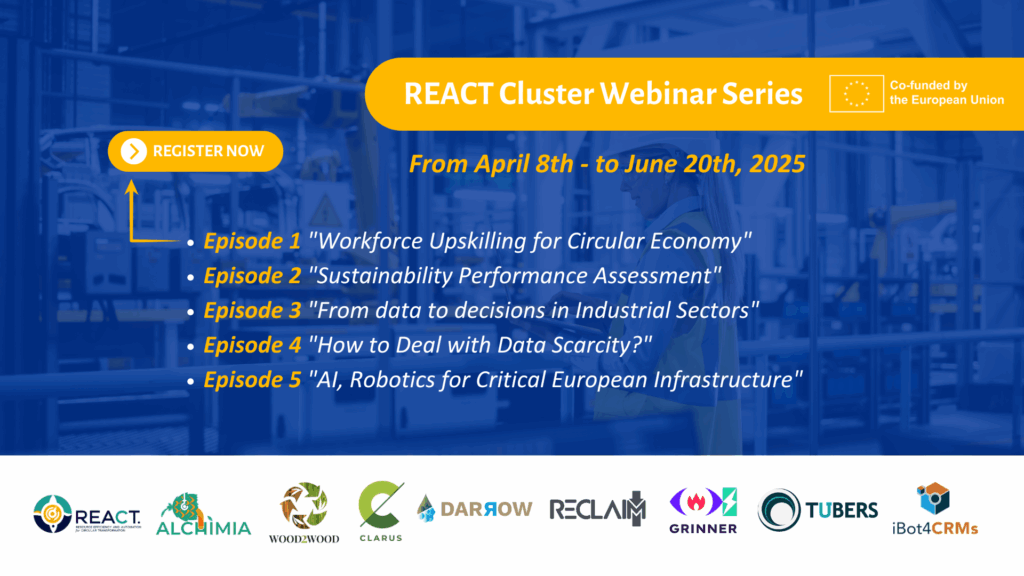
From April to June, eight EU-funded projects, under the umbrella of the REACT Cluster, shared cross-sectoral knowledge on the application of AI, Data and Robotics to enhance sustainability, reduce waste and drive strategic autonomy for Europe.
Europe’s green transition is an urgent imperative to reduce net greenhouse gas emissions by at least 55% by 2030 (compared to 1990 levels) and set the stage for Europe to become a net neutral continent by 2050. The transition has to the potential to transform the EU into a clean, resource-efficient and competitive economy.
Industry 5.0 must lead this green and digital transition and envision a future that respects planetary boundaries and contributes to human wellbeing “beyond prosperity and growth”. In other words, Europe must strive for an industrial transformation that is circular, clean and competitive benefiting workers and society. Leveraging AI, Data, and Robotics along with workforce upskilling and sustainability performance assessments for smarter and efficient decision-making has the potential to accelerate this green industrial transformation, particularly in waste and resource recovery management. Together, these components hold potential to drive the green and digital transition.
With this objective in mind, the REACT Cluster comprising of eight EU-funded projects shared cross-sectoral knowledge, from AI-powered municipal waste sorting (RECLAIM), critical raw materials separation (iBot4CRMs), scrap steel analysis (ALCHIMIA), to smarter wastewater treatment (DARROW), robotic WEEE sorting (GRINNER), sustainability performance measurement (CLARUS), wood waste cascade valorisation upcycling approaches (Wood2Wood), and reduce drinking water losses through pipeline inspection (Tubers project). All these projects combined are called the REACT Cluster (Resource Efficiency and Automation for Circular Transformation).
Webinar 1: What are the green skills of the future needed in the industrial sector to steer the transition towards a closed-loop circular economy?
Three questions guided the conversations:
1) How can companies attract and retain young talent in technical fields?
2) What roles do automation and digitalization play in shaping the workforce?
3) What skills will be essential for the future of the industrial sector?
Wood2Wood, ALCHIMIA, and Darrow projects shared cross-sectoral knowledge on workforce upskilling, talent retention, and the future of industrial employment in a changing landscape.
The circular transition requires evidence-based strategies and processes in place to work effectively. For this purpose, identifying the requirements and trends for skills development is cental to the transition.
In the wood industry, for example, waste from construction, demolition, and furniture presents a growing challenge that needs not only innovative tech solutions, but also a skilled workforce ready for the future.
These were the speakers for the event:
✅ Dean Stroud (Professor, Cardiff University / Prifysgol Caerdydd, ALCHIMIA Project) – Forging the Future: Upskilling for AI in the Steel Industry
✅ Jorge Tiago Martins (Senior Scientist, VTT TECHNICAL RESEARCH CENTRE OF FINLAND, Wood2Wood Project) – Future Skills for Circular Wood Waste Solutions: Why Foresight Matters for Industrial Transitions
✅ Beñat Elduayen Echave (Senior Researcher, Ceit Research Center, San Sebastian, Spain, DARROW Project) – AI Tools for Wastewater Treatment Plant Operators: Challenges and Impacts
✅ Antonius Schroeder (Senior Researcher, TU Dortmund University) – The Relevance of Skills for the Digital, Green and Social Transformation of the Steel Industry
During the webinar Jorge Tiago Martins from VTT presented on “𝐅𝐮𝐭𝐮𝐫𝐞 𝐒𝐤𝐢𝐥𝐥𝐬 𝐟𝐨𝐫 𝐂𝐢𝐫𝐜𝐮𝐥𝐚𝐫 𝐖𝐨𝐨𝐝 𝐖𝐚𝐬𝐭𝐞 𝐒𝐨𝐥𝐮𝐭𝐢𝐨𝐧𝐬: 𝐖𝐡𝐲 𝐅𝐨𝐫𝐞𝐬𝐢𝐠𝐡𝐭 𝐌𝐚𝐭𝐭𝐞𝐫𝐬 𝐟𝐨𝐫 𝐈𝐧𝐝𝐮𝐬𝐭𝐫𝐢𝐚𝐥 𝐓𝐫𝐚𝐧𝐬𝐢𝐭𝐢𝐨𝐧𝐬”
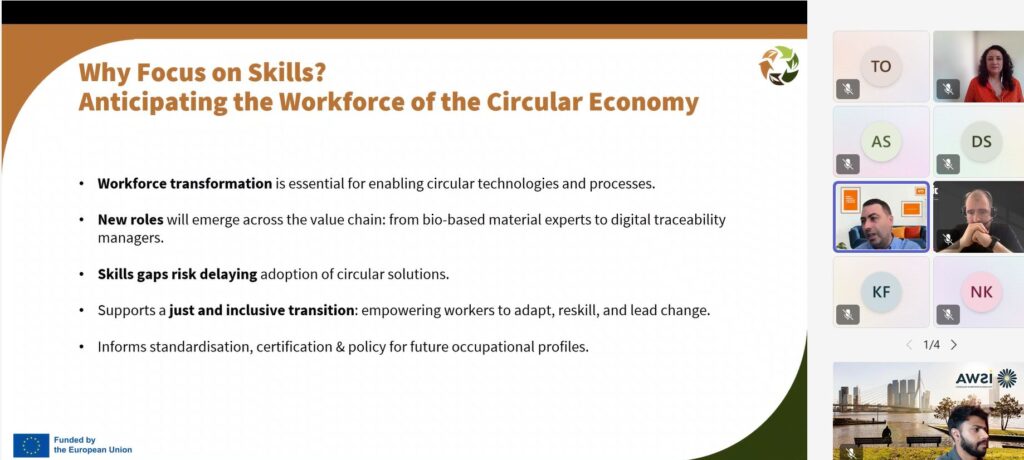
“𝑻𝒉𝒆 𝒇𝒖𝒕𝒖𝒓𝒆 𝒊𝒔 𝒏𝒐𝒕 𝒇𝒊𝒙𝒆𝒅—𝒐𝒖𝒓 𝒂𝒄𝒕𝒊𝒐𝒏𝒔 𝒂𝒏𝒅 𝒄𝒉𝒐𝒊𝒄𝒆𝒔 𝒔𝒉𝒂𝒑𝒆 𝒊𝒕,” Jorge said, as he introduced his topic to the audience.
“𝑾𝒆 𝒂𝒓𝒆 𝒂𝒕𝒕𝒆𝒎𝒑𝒕𝒊𝒏𝒈 𝒕𝒐 𝒂𝒏𝒔𝒘𝒆𝒓 𝒘𝒉𝒂𝒕 𝒇𝒖𝒕𝒖𝒓𝒆𝒔 𝒘𝒆 𝒘𝒂𝒏𝒕 𝒃𝒖𝒕 𝒂𝒍𝒔𝒐 𝒕𝒉𝒆 𝒇𝒖𝒕𝒖𝒓𝒆𝒔 𝒘𝒆 𝒘𝒂𝒏𝒕 𝒕𝒐 𝒂𝒗𝒐𝒊𝒅. 𝑭𝒐𝒓𝒆𝒔𝒊𝒈𝒉𝒕 𝒊𝒔𝒏’𝒕 𝒂𝒃𝒐𝒖𝒕 𝒑𝒓𝒆𝒄𝒊𝒔𝒆 𝒑𝒓𝒆𝒅𝒊𝒄𝒕𝒊𝒐𝒏𝒔, 𝒃𝒖𝒕 𝒂𝒃𝒐𝒖𝒕 𝒃𝒖𝒊𝒍𝒅𝒊𝒏𝒈 𝒂 𝒎𝒊𝒏𝒅𝒔𝒆𝒕 𝒇𝒐𝒓 𝒄𝒓𝒆𝒂𝒕𝒊𝒗𝒊𝒕𝒚, 𝒄𝒓𝒊𝒕𝒊𝒄𝒂𝒍 𝒕𝒉𝒊𝒏𝒌𝒊𝒏𝒈, 𝒂𝒏𝒅 𝒏𝒂𝒗𝒊𝒈𝒂𝒕𝒊𝒏𝒈 𝒄𝒐𝒎𝒑𝒍𝒆𝒙𝒊𝒕𝒚—𝒆𝒔𝒑𝒆𝒄𝒊𝒂𝒍𝒍𝒚 𝒓𝒆𝒍𝒆𝒗𝒂𝒏𝒕 𝒇𝒐𝒓 𝒕𝒉𝒆 𝒘𝒐𝒐𝒅 𝒘𝒂𝒔𝒕𝒆 𝒔𝒆𝒄𝒕𝒐𝒓.”
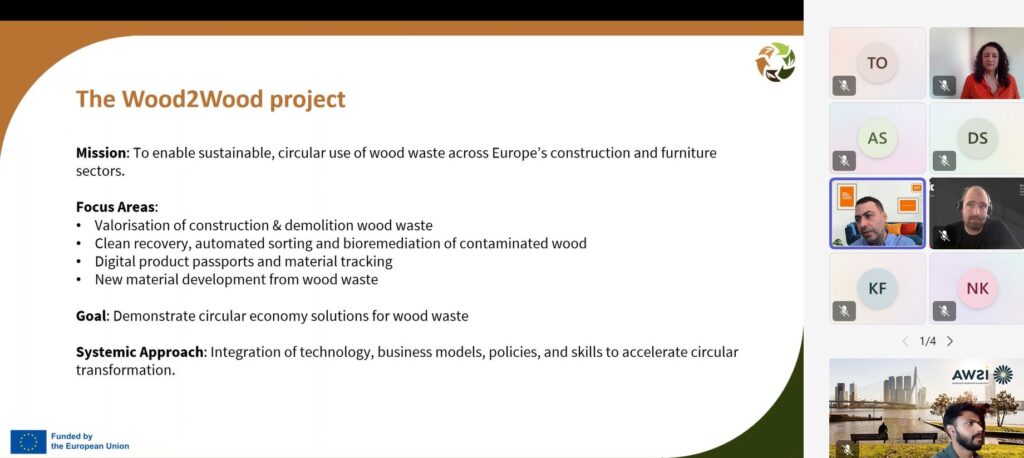
In Wood2Wood project, we aim to unlock the value in wood waste from construction, demolition, and furniture sectors.
Pilot innovations alone won’t scale without the right skills—”there’s a need for workforce development,” emphasised Jorge.
Watch the highlights from first webinar below
Webinar 2: How can you measure and improve sustainability performance across different levels and in a wide range of industries?
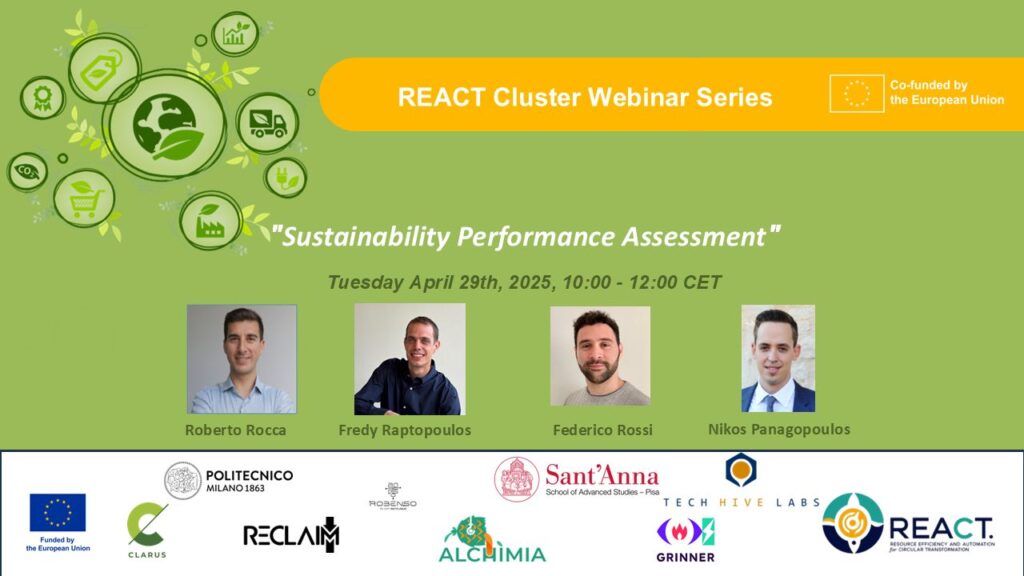
This webinar explored current approaches, tools, and methodologies for assessing sustainability performance in European Union Horizon projects.
Experts from within the EU-funded project consortia shared insights from ongoing initiatives in CLARUS Project, RECLAIM project, and ALCHIMIA Project providing practical perspectives on
➡️Environmental KPIs
➡️Circularity metrics
➡️Digital tools for monitoring sustainability across manufacturing processes.
The webinar featured Roberto Rocca, Postdoc Researcher at Polimi Manufacturing Group; Fredy Raptopoulos, CTO and Co-Founder at ROBENSO; Federico Rossi, Assistant Professor at the Interdisciplinary Center for Sustainability and Climate at Sant’Anna School of Advanced Studies; Nikos Panagopoulos, Senior Hardware Engineer at Tech Hive Labs. The session was chaired by Ludovica Miele, Researcher and Management Engineer at Universitat Politècnica de València.
Roberto Rocca presented “The Green Deal Index for Environmental Sustainability Assessment for the Food Industry” as part of the CLARUS project. He introduced a framework for quantifying environmental performance in alignment with the European Green Deal. The final indicator, the Green Deal Index (GDI), is derived through the Green Deal Performance Assessment Methodology, which is based on Life Cycle Inventory (LCI) data and a Green Deal Ontology that semantically formalizes the KPI computation for the GDI. He emphasised that the accurate analysis and traceability of sustainability data related to food production and consumption can bring substantial benefits for natural resource management in food manufacturing and significantly enhance sustainability performance and assessment.
Fredy Raptopoulos, Senior Engineer at Robenso, presented “Sustainability Performance Optimisation of Robotic Material Recovery Facility (MRF)” for the RECLAIM project. He showcased the world’s first fully automated, low-cost, AI-powered portable robotic Material Recovery Facility (prMRF), designed to enable decentralised material recovery operations anywhere, including remote locations. In his presentation, he first highlighted the strategic importance of such technologies for the future of sustainability, and then explained how RECLAIM measures the performance of the prMRF system and applies optimisation techniques to enhance its environmental and operational efficiency.
Federico Rossi, Assistant Professor at Scuola Superiore Sant’Anna, presented “The Role of Life Cycle Assessment (LCA) in the ALCHIMIA Project”. His talk emphasized how LCA serves as a decision-support tool within the steel-making industry. He explained that LCA can be used as a baseline assessment, as a means for process optimization, and to compare environmental impacts before and after implementing improvements.
Nikos Panagopoulos, Senior Hardware Engineer at Tech Hive Labs, presented “How and Why to Calculate the Environmental Cost of Reducing Fires in E-Waste Recycling Facilities | The Importance of Life Cycle Analysis in the Context of the GRINNER Project”. His intervention highlighted the often-overlooked sustainability dimension of safety improvements. In particular, he demonstrated how Life Cycle Analysis (LCA) can be used not only to assess the environmental benefits of the solution itself, but also to evaluate the impact of implementing the new technology, in terms of greenhouse gas emissions, energy use, material toxicity, and recyclability.
Key Takeaways
- Life Cycle Assessment (LCA) is a widely adopted methodology across sectors to support informed decision-making, track environmental impacts, and guide continuous improvement efforts.
- Digital tools and structured sustainability frameworks are essential to align industrial practices with broader policy objectives such as the European Green Deal.
- Automation and decentralised systems can significantly enhance sustainability by enabling resource-efficient operations, even in remote or less-developed settings.
- Accurate data analysis and traceability are critical to evaluate sustainability performance and unlock improvements in resource management and production systems.
- Safety-related innovations, often overlooked in sustainability discussions, can carry substantial environmental implications that should be assessed through comprehensive methods like LCA.
- A common trend across initiatives is the integration of AI, environmental metrics, and digital modelling to develop scalable, sector-neutral approaches for sustainability assessment.
Webinar 3: How are AI, Data and Robotics reshaping the way industries think, act, and evolve?
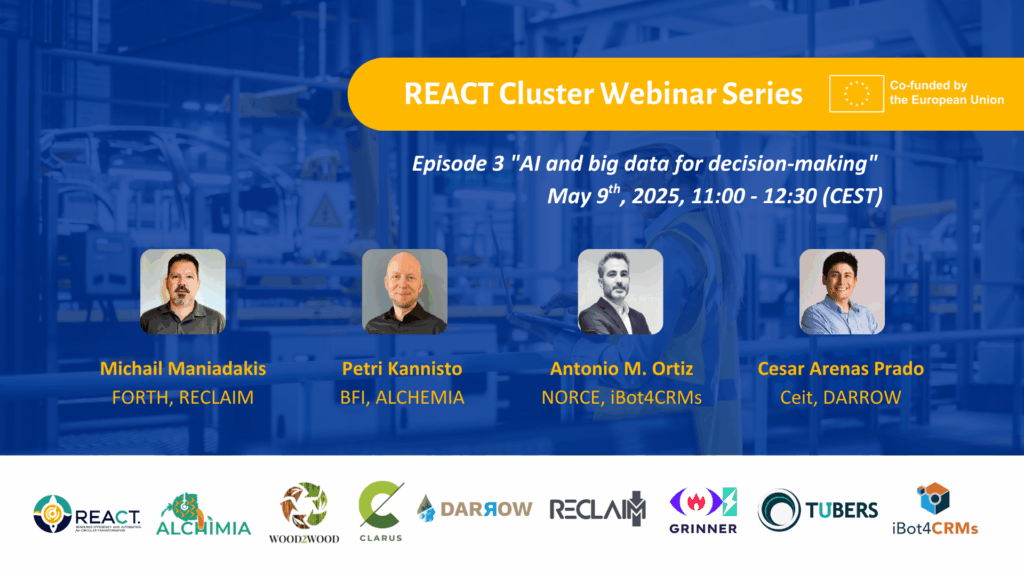
This webinar was organised by RECLAIM project in collaboration with DARROW Project explored the role of data and AI in revolutionising decision-making across sectors like waste management, resource recovery, and circular manufacturing, enhancing sustainability and opening new frontiers in industrial efficiency.
🔍 Agenda Highlights:
➡️AI-powered scrap steel analysis
➡️Robotics for Critical Raw Materials ecovery
➡️Decision-making in dynamic environments
➡️Human-robot collaboration
Moderated by Léa Zamuner, the technical communications coordinator for the International Solid Waste Association (ISWA) and the iBot4CRMs project, the session started with presentations by specialists Michalis Maniadakis from the RECLAIM project, and the Institute of Computer Science-FORTH, Petri Kannisto from the ALCHIMIA project and the Betriebsforschungsinstitut, Antonio M.Ortiz from the iBot4CRMs project and the Norwegian Research Centre, and Cesar Arenas Prado from the DARROW project and the Ceit:
- RECLAIM’s Michalis presented the portable robotic Material Recovery Facility (prMRF), which is touted as the future of decentralised material recovery activities for remote areas in Europe;
- Petri introduced a decentralised Artificial Intelligence (AI) and data solution to support the green transition of Europe’s major metallurgy industries;
- Antonio explained how AI-powered robots are being developed to automate urban mining and improve the recovery of critical raw materials;
- Cesar highlighted efforts to enhance wastewater treatment by reducing energy use, emissions, and chemical consumption while improving water quality.
All the projects also introduced how they use AI for resource recovery from different waste streams and sectors, such as municipal solid waste, industrial waste, urban waste and wastewater. While each waste stream is different, all these projects had a unified goal to collect data to improve the processes and increase efficiency to ultimately make European industries more competitive.
In this regard, the panel discussion delved into key themes, such as data usage for robot control, evaluating robotic decisions, and the integration of AI and non-AI methods for data-driven decision-making. Participants also discussed data collection strategies, AI-assisted process optimisation, and the challenges of scaling up these solutions.
Following an engaging Q&A session with the audience, the experts were invited to explore potential areas of collaboration among their projects. Clear opportunities emerged between RECLAIM and iBot4CRMs, both of which employ similar robotic systems, such as vision-based component identification. Other promising topics included shared methodologies and the use of continual learning approaches in AI. Petri also called attention to the overarching goal shared by all the projects: advancing a circular economy and sustainability while safeguarding human welfare and building resilience. He underlined the importance of continuing this collaborative work to achieve that common vision.
Key takeaways from the webinar
Data quality is the foundation for AI success
- (Michalis) emphasised that the efficacy of AI and Data systems rests on the quality of the input waste stream. For RECLAIM, industries must ensure consistent and standardised waste types (e.g., Plastic, Metal and Drinking Cartons (PMD) for a solution like prMRF to be effective.
- Poor-quality or inconsistent inputs undermine optimisation and recovery performance.
Integration of AI, Robotics, and vision systems must be seamless and profitable
- Antonio from iBot4CRMs) pointed out that for AI-driven solutions to scale, they must integrate robotics, computer vision, and AI models effectively.
- Adoption depends heavily on economic viability — if Critical Raw Materials (CRMs) recovery processes are not profitable, waste management plants won’t adopt them.
Sustainable models beyond research projects
- Petri From Alchimia said to ensure long-term impact, AI optimization software must transition from research projects to operational use through either a sustainable service model or operator-led adoption.
AI will not replace plant operators — It will empower them
- (Cesar) stressed the importance of gaining operator trust. AI tools are meant to support human decision-making, enhance energy efficiency, and simplify complex operational decisions — not eliminate human roles.
Watch RECLAIM’s contribution in the video below
Webinar 4: Synthetic Data Generation – Producing Data in Simulation, Training AI on Small and Larger Datasets
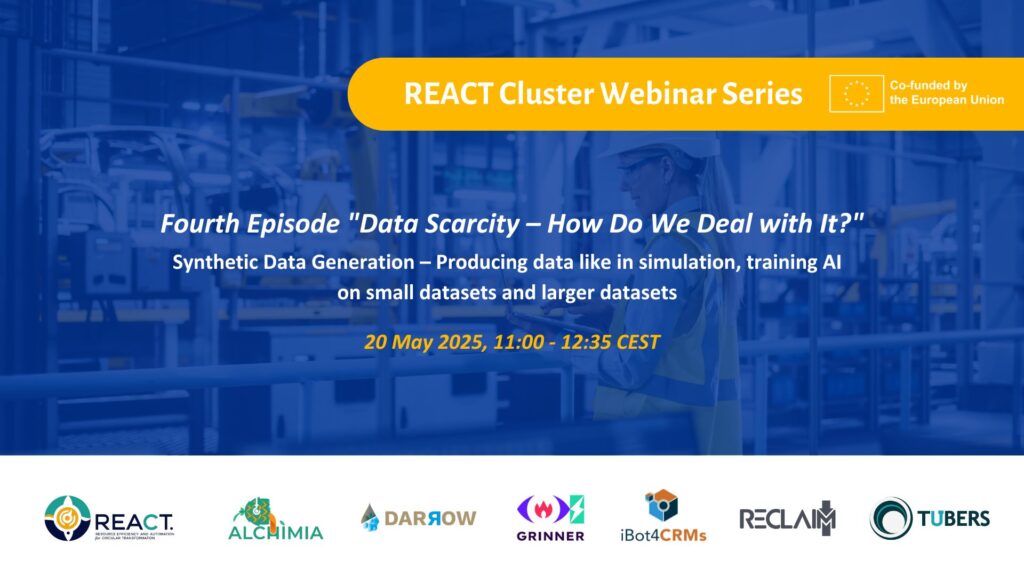
The REACT Cluster’s 4th webinar, hosted by the GRINNER Project on 20 May, explored how synthetic data can address the challenge of data scarcity in industrial AI applications. In many industrial settings, collecting large, high-quality datasets is costly, time-consuming, or commercially sensitive – making synthetic data a valuable solution, especially when data is limited or imbalanced.
The event featured expert insights from several partner projects within the cluster:
- Antonis Porichis from the University of Essex (GRINNER) opened the session by discussing the broader issue of data scarcity in industrial model training.
- Marcos Varveris and James Lloyd from EXUS (ALCHIMIA) followed with a presentation on how synthetic data can help address these challenges.
- Luis Vitores Valcárcel García from Ceit (DARROW) presented on using calibrated mechanistic models as a solution to data scarcity.
- Michalis Maniadakis from FORTH (RECLAIM) shared insights on generating synthetic images of waste streams in material recovery processes.
- Antonio M. Ortiz from Norce Research (iBot4CRMs) explored data augmentation techniques for improving critical raw materials recovery.
- Farhan Mahmood from the University of Essex (TUBERS) concluded the presentations with a contribution.
The webinar showcased practical solutions and collaborative innovation from across the REACT Cluster, highlighting the growing role of synthetic data, transfer learning, few-shot learning, and anomaly detection in industrial AI.
Webinar 5: The importance of AI, Data, and Robotics for improving the efficiency of critical European infrastructure and industry

On June 18, the fifth and final part of a series of webinars organised by the React Cluster took place. The last episode was organised by the TUBERS Project.
The webinar featured Joel Vanden Bosch from ALSYMEX, Aitor Agirre from IKERLAN, Marina Pellegrino from IRIS, Dimitris Karamouslis from CERTH, Luis V.Valcárcel from CEIT, Raquel Lazcano from Eviden and was chaired by Eirini Angeli, Project Manager at TECH HIVE LABS.
Joel Vanden Bosch from ALSYMEX opened the session by presenting the TUBERS project’s solution on “The Flow of Innovation: AI, Data and Robotics in Water Infrastructure.” He detailed the ambitious goal of eliminating non- revenue water and leaks in Europe’s extensive drinking water pipe networks. By deploying robotic carriers for in-pipe inspection, monitoring, and repair, TUBERS aims to significantly improve energy efficiency, reduce CO2 emissions, and preserve vital water resources, offering substantial benefits for municipalities and water companies.
Aitor Agirre from IKERLAN, followed with a discussion on “Clarus MLOps: Automating Data and AI Model Sharing in the European Food Industry” for the CLARUS project. He explained how AI technologies are being used to improve the sustainability of food production by reducing energy and water consumption, and optimising logistics. The Clarus MLOps platform, integrated with the IDS (International Data Spaces) cloud data space, supports the entire AI model lifecycle, ensuring secure and trusted data and model sharing between stakeholders.
Next, Javier and Marina from Iris jointly presented on behalf of the RECLAIM project, discussing “Hyperspectral Imaging for Waste and Material Classification: Reclaim’s Portable Material Recovery Facility Application.” They showcased RECLAIM’s portable & robotic Material Recovery Facility (prMRF), designed for decentralised waste sorting near the source. Marina elaborated on their Hyperspectral Imaging (HSI) system, which provides real time waste monitoring and classification for effective pMRF sorting operations.
Dimitris Karamouslis from CERTH in the Wood2Wood Project then delved into “How DPP improves the data management and interoperability concerning the wood materials ” as part of the WOOD2WOOD project. He introduced the Digital Product Passport (DPP), a tool designed to enhance transparency and sustainability across the entire lifecycle of wood materials. Dimitris explained how the DPP centralises data, improves traceability, supports circular strategies, and integrates with AI tools to optimise processes and ensure compliance with future regulations.
Luis V.Valcárcel from CEIT, presented “Making wastewater treatment more sustainable and efficient using a data-driven AI solution” for the DARROW project. He outlined DARROW’s objectives to optimise resource recovery and improve overall efficiency in wastewater treatment plants through AI systems. Luis emphasised the critical need for reliable, real-time data, and highlighted the importance of human oversight, transparency, explainable AI, and robust cybersecurity in light of new EU regulations classifying wastewater treatment as critical infrastructure.
Finally, Raquel Lazcano from Eviden discussed “Boosting Industrial Efficiency and Collaboration Through Federated Learning” for the ALCHIMIA project. She explained how federated learning is being leveraged to reduce energy consumption and emissions in the EU metallurgy industry. Raquel underscored the benefits of this decentralised AI training approach, particularly in enhancing data privacy, scalability, and compliance.
Key Takeaways
- Integrated Solutions: AI, data, and robotics are seamlessly enhancing the efficiency and resilience of vital European infrastructures like water and wastewater treatment.
- Data is Foundational: Robust, reliable, and accessible data is crucial for effective AI and data-driven decisions, even amidst challenges like sensor drift.
- Decentralised Automation: Innovations like in-pipe robots and portable recovery facilities highlight a trend towards efficient, localized, and privacy-preserving automated solutions.
- Ethical AI & Compliance: Growing EU AI regulations for critical infrastructure demand human oversight, transparency, explainability, and strong cybersecurity.
- Tangible Sustainability: These technologies are directly contributing to European Green Deal objectives through significant energy savings, CO2 reductions, and resource preservation.
- Scalable & Transferable: The presented solutions are designed for broad applicability, offering frameworks adaptable across diverse industries and sectors.
- Inspiring Impact: This final React Cluster webinar underscored the transformative potential of AI, data, and robotics, showcasing collaborative efforts making a profound impact on European industry and infrastructure.
Close on the heels of this webinar series, the REACT Cluster also participate at the EU Green Week in Brussels. You can click on this article to read more.
